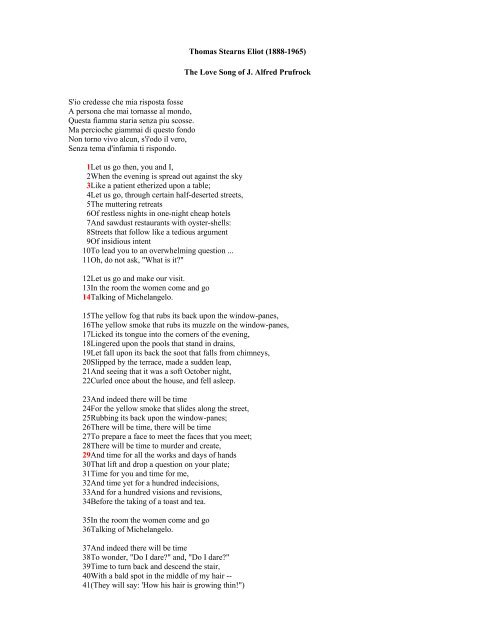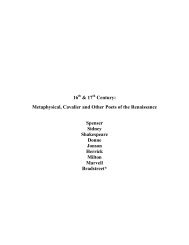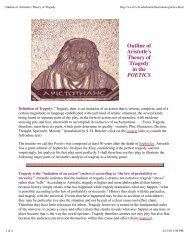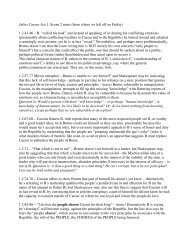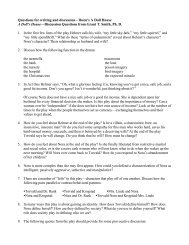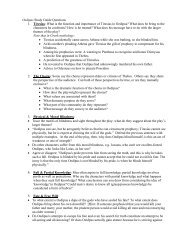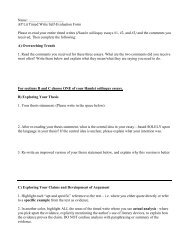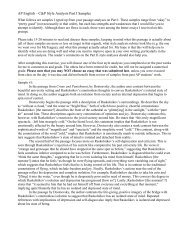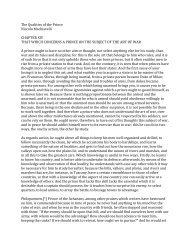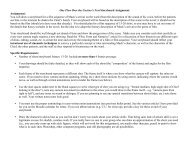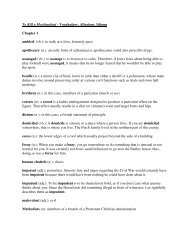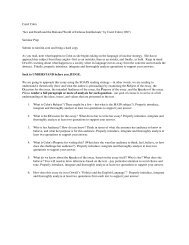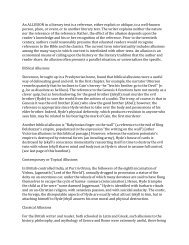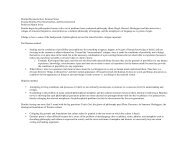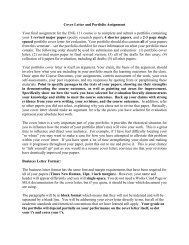The Love Song of J. Alfred Prufrock S'io ... - Whs.babienko.net
The Love Song of J. Alfred Prufrock S'io ... - Whs.babienko.net
The Love Song of J. Alfred Prufrock S'io ... - Whs.babienko.net
- No tags were found...
Create successful ePaper yourself
Turn your PDF publications into a flip-book with our unique Google optimized e-Paper software.
Thomas Stearns Eliot (1888-1965)<strong>The</strong> <strong>Love</strong> <strong>Song</strong> <strong>of</strong> J. <strong>Alfred</strong> <strong>Prufrock</strong><strong>S'io</strong> credesse che mia risposta fosseA persona che mai tornasse al mondo,Questa fiamma staria senza piu scosse.Ma percioche giammai di questo fondoNon torno vivo alcun, s'i'odo il vero,Senza tema d'infamia ti rispondo.1Let us go then, you and I,2When the evening is spread out against the sky3Like a patient etherized upon a table;4Let us go, through certain half-deserted streets,5<strong>The</strong> muttering retreats6Of restless nights in one-night cheap hotels7And sawdust restaurants with oyster-shells:8Streets that follow like a tedious argument9Of insidious intent10To lead you to an overwhelming question ...11Oh, do not ask, "What is it?"12Let us go and make our visit.13In the room the women come and go14Talking <strong>of</strong> Michelangelo.15<strong>The</strong> yellow fog that rubs its back upon the window-panes,16<strong>The</strong> yellow smoke that rubs its muzzle on the window-panes,17Licked its tongue into the corners <strong>of</strong> the evening,18Lingered upon the pools that stand in drains,19Let fall upon its back the soot that falls from chimneys,20Slipped by the terrace, made a sudden leap,21And seeing that it was a s<strong>of</strong>t October night,22Curled once about the house, and fell asleep.23And indeed there will be time24For the yellow smoke that slides along the street,25Rubbing its back upon the window-panes;26<strong>The</strong>re will be time, there will be time27To prepare a face to meet the faces that you meet;28<strong>The</strong>re will be time to murder and create,29And time for all the works and days <strong>of</strong> hands30That lift and drop a question on your plate;31Time for you and time for me,32And time yet for a hundred indecisions,33And for a hundred visions and revisions,34Before the taking <strong>of</strong> a toast and tea.35In the room the women come and go36Talking <strong>of</strong> Michelangelo.37And indeed there will be time38To wonder, "Do I dare?" and, "Do I dare?"39Time to turn back and descend the stair,40With a bald spot in the middle <strong>of</strong> my hair --41(<strong>The</strong>y will say: 'How his hair is growing thin!")
42My morning coat, my collar mounting firmly to the chin,43My necktie rich and modest, but asserted by a simple pin --44(<strong>The</strong>y will say: "But how his arms and legs are thin!")45Do I dare46Disturb the universe?47In a minute there is time48For decisions and revisions which a minute will reverse.49For I have known them all already, known them all:50Have known the evenings, mornings, afternoons,51I have measured out my life with c<strong>of</strong>fee spoons;52I know the voices dying with a dying fall53Beneath the music from a farther room.54 So how should I presume?55And I have known the eyes already, known them all--56<strong>The</strong> eyes that fix you in a formulated phrase,57And when I am formulated, sprawling on a pin,58When I am pinned and wriggling on the wall,59<strong>The</strong>n how should I begin60To spit out all the butt-ends <strong>of</strong> my days and ways?61 And how should I presume?62And I have known the arms already, known them all--63Arms that are braceleted and white and bare64(But in the lamplight, downed with light brown hair!)65Is it perfume from a dress66That makes me so digress?67Arms that lie along a table, or wrap about a shawl.68 And should I then presume?69 And how should I begin?70Shall I say, I have gone at dusk through narrow streets71And watched the smoke that rises from the pipes72Of lonely men in shirt-sleeves, leaning out <strong>of</strong> windows? ...73I should have been a pair <strong>of</strong> ragged claws74Scuttling across the floors <strong>of</strong> silent seas.* * * *75And the afternoon, the evening, sleeps so peacefully!76Smoothed by long fingers,77Asleep ... tired ... or it malingers,78Stretched on the floor, here beside you and me.79Should I, after tea and cakes and ices,80Have the strength to force the moment to its crisis?81But though I have wept and fasted, wept and prayed,82Though I have seen my head (grown slightly bald) brought in upon a platter,83I am no prophet -- and here's no great matter;84I have seen the moment <strong>of</strong> my greatness flicker,85And I have seen the eternal Footman hold my coat, and snicker,86And in short, I was afraid.87And would it have been worth it, after all,88After the cups, the marmalade, the tea,89Among the porcelain, among some talk <strong>of</strong> you and me,90Would it have been worth while,
91To have bitten <strong>of</strong>f the matter with a smile,92To have squeezed the universe into a ball93To roll it towards some overwhelming question,94To say: "I am Lazarus, come from the dead,95Come back to tell you all, I shall tell you all" --96If one, settling a pillow by her head97 Should say: "That is not what I meant at all;98 That is not it, at all."99And would it have been worth it, after all,100Would it have been worth while,101After the sunsets and the dooryards and the sprinkled streets,102After the novels, after the teacups, after the skirts that trail along the floor --103And this, and so much more?--104It is impossible to say just what I mean!105But as if a magic lantern threw the nerves in patterns on a screen:106Would it have been worth while107If one, settling a pillow or throwing <strong>of</strong>f a shawl,108And turning toward the window, should say:109 "That is not it at all,110 That is not what I meant, at all."111No! I am not Prince Hamlet, nor was meant to be;112Am an attendant lord, one that will do113To swell a progress, start a scene or two,114Advise the prince; no doubt, an easy tool,115Deferential, glad to be <strong>of</strong> use,116Politic, cautious, and meticulous;117Full <strong>of</strong> high sentence, but a bit obtuse;118At times, indeed, almost ridiculous--119Almost, at times, the Fool.120I grow old ... I grow old ...121I shall wear the bottoms <strong>of</strong> my trousers rolled.122Shall I part my hair behind? Do I dare to eat a peach?123I shall wear white flannel trousers, and walk upon the beach.124I have heard the mermaids singing, each to each.125I do not think that they will sing to me.126I have seen them riding seaward on the waves127Combing the white hair <strong>of</strong> the waves blown back128When the wind blows the water white and black.129We have lingered in the chambers <strong>of</strong> the sea130By sea-girls wreathed with seaweed red and brown131Till human voices wake us, and we drown.Notes1] <strong>The</strong> epigraph comes from the Inferno <strong>of</strong> Dante's Divine Comedy (XXVII, 61-66). Count Guido da Montefeltro, embodied in aflame, replies to Dante's question about his identity as one condemned for giving lying advice: "If I believed that my answerwould be to someone who would ever return to earth, this flame would move no more, but because no one has ever returned alivefrom this gulf, if what I hear is true, I can reply with no fear <strong>of</strong> infamy."3] etherized: anesthetized.14] Michaelangelo: Italian painter, poet, and sculptor (1475-1564).
29] works and days: Hesiod's Works and Days, an 8th-century (B.C.) description <strong>of</strong> rural life.42] morning coat: a formal coat with tail.52] dying fall: love-sick Duke Orsino's opening line in Shakespeare's Twelfth Night, "That strain again! It had a dying fall" (I.i.1),referring to a piece <strong>of</strong> music. Cf. "Portrait <strong>of</strong> a Lady," line 122.60] butt-ends: the discarded, unsmoked ends <strong>of</strong> cigarettes or cigars.82] Herod gave John the Baptist's decapitated head to the dancer Salome as a reward (Mark 6.17-29; Matthew 14.3-11).83] I am no prophet: Amos said, "I was no prophet, neither was I a prophet's son; but I was an herdman, and a gatherer <strong>of</strong>sycomore fruit" (Amos 7.14), when commanded by King Amaziah <strong>of</strong> Bethel not to prophesy.92] Cf. Andrew Marvell's "Let us roll all our strength, and all / Our sweetness, up into one ball" ("To his Coy Mistress").94] Lazarus: Jesus brought Lazarus, the brother <strong>of</strong> Mary and Martha, back from the dead by literally entering his tomb andbringing out the recently buried man alive (John 11.1-44). Jesus also tells a parable <strong>of</strong> how the poor man Lazarus went to heaven,and the rich man Dives to hell, and how Dives begged Abraham to send Lazarus back to warn his five brothers about damnationand was rebuked "if they hear not Moses and the prophets, neither will they be persuaded, though one rose from the dead" (Luke16.19-31).101] sprinkled streets: necessary to keep the dust down.105] a magic lantern: device that throws a magnified image <strong>of</strong> a picture on glass onto a white screen in a dark room.111] Prince Hamlet: not Shakespeare's noble prince, who resisted the temptation to commit suicide in his "To be or not to be"speech (alluded to at line's end), but instead characters like Rosencrantz and Guildenstern (cf. 112-16), Polonius (cf. 117), andOsric (cf. 118). Ezra Pound wrote Harriet Monroe on Jan. 31, 1915:I dislike the paragraph about Hamlet, but it is an early and cherished bit and T.E. won't give it up, and as it is the only portion <strong>of</strong>the poem that most readers will like at first reading, I don't see that it will do much harm" (Letters <strong>of</strong> Ezra Pound 1907-1941, ed.D. D. Paige [London: Faber and Faber, 1951]: 92-93).113] progress: the travelling <strong>of</strong> a royal prince through the English countryside, from stop to stop, together with wagons loadedwith possessions, and with servants and courtiers.117] high sentence: a phrase from Chaucer's Canterbury Tales, meaning "elevated, serious and moral thoughts expressedformally."119] the Fool: Shakespeare's plays have several characters called "the Fool," including the king's loyal servant and critic in KingLear.121] the bottoms <strong>of</strong> my trousers rolled: that is, with cuffs, a novelty in fashion.122] Shall I part my hair behind?: an avant-garde, potentially shocking hair-style.124] Cf. John Donne's "<strong>Song</strong>," with its "Teach me to hear mermaids singing." Arhtur Symons' <strong>The</strong> Symbolist Movement inLiterature (London: Heinemann, 1899) quotes "El Desdichado" (`<strong>The</strong> Disinherited') by Gérard de Nerval(1808-55): "J'ai rêvédans la grotte où nage la sirène" (`I have dreamed in the cave where the siren swims'; p. 37).
Babienko English“<strong>The</strong> <strong>Love</strong> <strong>Song</strong> <strong>of</strong> J. <strong>Alfred</strong> <strong>Prufrock</strong>”1. How would you characterize the speaker <strong>of</strong> the poem? What kind <strong>of</strong> man is <strong>Prufrock</strong>? What sort <strong>of</strong>personality does he have? Where does he “live”? What does he desire? What does he fear?2. How does the Epigraph from Dante’s Inferno contribute to your understanding <strong>of</strong> the speaker and thepoem itself?3. What elements <strong>of</strong> the poem suggest that the speaker and his view <strong>of</strong> the world are characterized byfeelings <strong>of</strong> alienation, estrangement, and loneliness? Look at imagery and use <strong>of</strong> figurative language.4. What images in the poem suggest paralysis and powerlessness? Identify and explain.5. What images in the poem specifically suggest sexual desire and impotence? Identify and explain.6. Identify and explain allusions in this poem; how do allusions (biblical, mythological, literary)contribute to the meaning <strong>of</strong> the poem?7. What contrasts exist in the poem? How do the contrasts in the poem reveal <strong>Prufrock</strong>’s view <strong>of</strong> himselfand the world?8. Eliot was Modernist poet. Modernist writers <strong>of</strong>ten portray the experience <strong>of</strong> fragmentation thatcharacterized modern life – the rapid onslaught <strong>of</strong> competing, seemingly disjointed stimuli; theanonymity and isolation <strong>of</strong> urban life; the detachment from one’s surroundings (people and objects);the dehumanizing effects <strong>of</strong> industrialization; the chaos <strong>of</strong> modern life, etc. How is this sense <strong>of</strong>fragmentation emphasized through the poem’s structure and the rhyme scheme?


